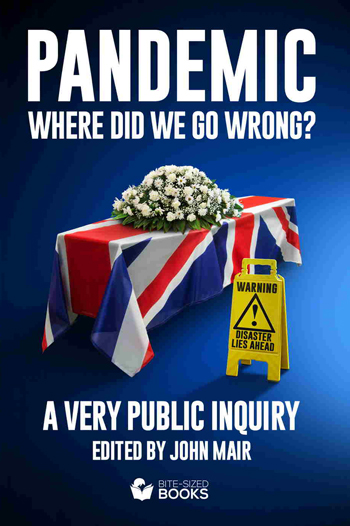
The depressing realisation came to me on one of my long and peaceful lockdown walks in the Northumberland countryside. And it made me unhappy. Very unhappy. The disheartening awareness was that I had concluded that my trade of more than 30 years wasn’t very good at what it did. It certainly wasn’t as good as it thought it was.
And in not being very good at what it did during the Covid-19 pandemic, it failed the country, it failed its individual readers, viewers and listeners, and it failed itself. It had certainly failed many of my neighbours, many of whom had simply exited from the daily process of being ground down by the news and how it was presented.
Now this is, of course, a wild generalisation – I’m happy to admit that. Though I don’t believe it is an exaggeration.
The start of lockdown saw a surge in news consumption. By the end of lockdown, there was a slump.
Accentuate the positive
Clearly in recent months, many journalists have been working non-stop in stressful circumstances, covering coronavirus and its ramifications. And clearly, over the years there have been fabulous success stories in the UK news business. Whether you like them or not, The Sun, the Daily Mail and the Guardian have all been brilliant editorial products, though some have lived with more financial solidity than others. The Times has evolved a variety of ambitious new ways of interacting with its customer base, which at least shows some hope of longevity.
Magazines like The Economist, The Spectator and Private Eye have developed business models that may be sustainable in this digital world.
There have been numerous great stories over the decades. From in-depth ground-breaking investigations like the Sunday Times over Thalidomide, or the Daily Mail on Stephen Lawrence to The Times over the Rotherham teenage sex scandal, the industry has achieved remarkable things.
Good news on the small screen
Our various broadcasters have produced impressive journalism too and regional newspapers have also had their fair share of highlights. Recent months have showcased great examples from journalists across the different strands of the industry – Peter Foster of the Financial Times and Tim Harford and the team on Radio 4’s More or Less and some of Fergus Walsh’s BBC in-hospital reports stand out – but they have been overshadowed by the general air of cack-handedness, shallowness and sheer lack of skills and talent shown by too many of those entrusted with being the conduits between what is happening and the public.
(Don't) eliminate the negative
The simple truth is that journalism in the UK in covering what is the story of our lifetimes – and nothing else comes close, really, not 9-11, not the Iraq war, not the financial crash of 2008 – has been found out by the public at large for what many have long suspected (and a view which I have fought hard against over many years). It’s not as good as it thinks it is.
If the government stands accused of being ill-prepared for this pandemic, then the news media is equally charged. In the presence of a captive audience, with time on its hands, wanting to be given a balance of facts and fair and accurate analysis, we weren’t organised. We didn’t have the game plan ready for the story of our lives; and when it all erupted, we didn’t show ourselves in the best way.
If the government stands accused of being ill-prepared for this pandemic, then the news media is equally charged.
A declining trust
Trust (as well as circulation and readership) in print media has been declining for decades, but newspapers have now been joined by broadcasters too in failing to win the confidence of news consumers. The way the Covid-19 pandemic has been reported has exacerbated this decline. The start of lockdown saw a surge in news consumption. By the end of lockdown, there was a slump. People weren’t watching or reading; the unending diet of bad news had driven many news users away; the desire to catch out politicians had won the battle in the early days; the egos of high-profile journalists to be seen as cleverer-than-thou (asking whether Boris Johnson was taking up a bed someone else should have had just hours before he entered intensive care was a pretty good low to have achieved) had been seen as almost more important than anything else. And all the while, the reader, the viewer and the listener were being excluded.
The opportunity for the news media industry to re-invent itself, to become the nation’s explainer-in-chief, to develop a new life in the changing environment of a digital world had not just been lost, it had been thrown away with breath-taking arrogance.
Because, however it is examined and despite how may great stories we believe, we have published and broadcast, how ineffectually we think Boris Johnson has acted, how we have shown numerous government ministers to be incompetent, as we entered the end of lockdown, the fact is that the industry will have fewer viewers, listeners and readers than at the start of it all. And that must be deemed a failure.
Lone wolf crying?
I suspect I may be a lone voice in all this. I suspect the industry and those who work in it may indulge themselves in an orgy of didn’t-we-do-well self-congratulation, while ignoring the end result of it all.
And that end result is a sector hammered hard by the economic fall-out – as most sectors are of course – but also one that will have lost the goodwill of many of its most fervent supporters, who will not return to the fold, who will not trust the news media to keep them properly informed, who will not help the sector return to anything like good health.
However, I don’t believe this was a poor panicky response to the suddenly emerging crisis. I think these failings have been a long time in the making.
Been a long time coming
First, back in 2014, when the demise of the traditional sub-editor was in full swing, I wrote an article for InPublishing magazine in which I bemoaned the fact that over many years, our trade had been happy to accept that ‘nearly right’ was an acceptable level of correctness to achieve; that we had long abandoned, with some honourable exceptions, the basic standard of being right. The scars on my back still remain. It wasn’t a popular argument to proffer. And I’ve no doubt it is not a popular argument now. I said then: “We have come to accept that nearly right is fine, that it doesn’t matter if we aren’t exactly correct. And shame on us for that acceptance.” Nothing seems to have changed in the last six years – and certainly nothing has changed in the last few months.
The business model no longer works
And second, a factor behind this was the downfall of the business model that underpins traditional news in the UK – as essentially it is bust, or at best, not in the rudest of good health. Streaming TV services have caused havoc with the long-term strategies of the BBC, ITV and Channel 4; the licence fee is under attack and advertising yields are plummeting.
Newspapers made the gravest of errors when they initially gave away their content when digital came knocking and are paying the price now.
And alongside all of this is the ubiquitous presence of social media in all its various permutations.
So, when the pandemic arrived, the industry was in a state of disruption and wasn’t ready. I’ll wager no-one in the media had prepared for what would happen if the economy just shut one day as it did. No game planning there.
Key information was hard to find and columnists quickly ran out of original steam.
A laughing stock
And let’s be blunt – the Downing Street press briefings quickly made a laughing stock of journalism with aggressive and long-winded (some more than a minute) questioning from the alleged cream of our crop, showing themselves to be more concerned with trying to get Matt Hancock or whoever to say an embarrassing word out of place, rather than posing a closed question that might possibly provoke a direct answer.
Even when Dominic Cummings was on the ropes in the infamous Rose Garden press conference they failed. “Why can’t they ask just one question?” tweeted a former very experienced editor, now a university lecturer and trainer. And he was right. A style of questioning that wouldn’t pass muster in the first term of any journalism course.
I am in danger of slipping into old-dinosaur territory here, but whatever happened to the traditional style or preparing a single, simple question?
Over the years, the strengths of starting questions with the words ‘when’, ‘why’, ‘how’, ‘what’ and ‘who’ – as ever so lovingly embedded in me by my first news editor (the legendary, as they were then, and now sadly late, Lawrie Simpkin, Leicester Mercury) – have not gone away. Though that concept rarely found its way into Downing Street from March onwards.
Lawrie, and most of his generation, would have been horrified by what was on show in the name of journalism. Many of the political reporters would not have passed the National Council for the Training of Journalists’ (NCTJ) old interview examination – that’s for sure.
To be fair, perhaps it was the environment. Media-trained politicians, in particular, who were keen not to answer questions, weren’t always cooperative.
The setting may have made it impossible for satisfactory questioning to have taken place. If so, the journalists should not have taken part. Although, when the political editors and reporters (who all through have mixed reporting and unsupported commentary) made way on occasions for the science and health specialists, the standards seemed to improve. These specialists, who had some knowledge of the science, seemed prepared to be more balanced and objective – some might say traditional – in their approach.
But the briefings were just one aspect, albeit a high-profile aspect, that may have over-coloured opinions of how journalism was working. Speech radio in its various forms seemed determined to catch out the government in rushed interviews, rather than offer a service of explanation and help for the listener. How many listeners locked in their homes with nothing to do, laughed at every Today presenter who said, “We’re short of time”. The one thing their listeners weren’t short of was time. How about having fewer interviewees but giving them more minutes? Just a thought.
And while Piers Morgan may have felt he was holding government ministers to account by his style of interrogation, eventually being portrayed as the country’s shouter-in-chief was not an accolade many would desire.
Newspapers had the chance, despite the virtual complete loss of casual sales for many weeks, of reclaiming lost ground; to forget the spin; to become the explainers, the interpreters, the bringers of clear facts and advice, to offer a balance, to be right and not just nearly right, to not just depress their readers. They didn’t. Key information was hard to find and columnists quickly ran out of original steam.
Who teaches them?
I’ve asked myself why. I think the regionals have done a pretty good job of training over the years. The journalism colleges are, in the main, of a high standard, too. The BBC and nationals invest pretty heavily in development as well. So that shouldn’t be a reason. Or perhaps it wasn’t good enough to prepare ourselves for days like these? Perhaps we as senior editors didn’t realise that we had to be better.
Or, perhaps, the industry had developed such an overwhelming feeling of grandiose self-importance, because we had brought down so many politicians, sports stars and other characters over the years, that we felt it didn’t matter. We would be right, people would listen, and we would be seen as morally superior.
When the inevitable public inquiry takes place into the country’s and the government’s handling of the pandemic, it should be joined by another study – one into how the media fared over these recent months. How it acted, the work it produced, the standards it displayed, how it looked after its readers, viewers and listeners, what the public thought of it.
What lessons?
Will we learn anything? I would like to think so. As lockdown eased, the tone of broadcasting seemed to mellow. That may have been down to greater self-awareness, but it also might have been down to the public’s feedback. But journalism lives in its own bubble and echo chamber, like most other interest groups, so don’t hold your breath. But there are great trainers out there, thinkers who may see that the way we tried to do it in lockdown wasn’t totally right.
I hope I am wrong; I hope the despair I feel at journalism’s performance is misplaced. But I suspect not. We had a chance to re-establish news as a core essential in UK daily life. We blew it. And, as the economic ramifications gather pace across the whole sector, that may be a missed opportunity that we will come to regret.
We had a chance to re-establish news as a core essential in UK daily life. We blew it.

This article was first published in the new book, 'Pandemic: Where Did We Go Wrong?', edited by John Mair and published by Bite-Sized Books.












